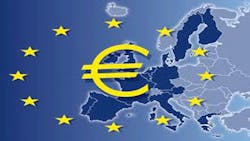BRUSSELS -- The eurozone recession seems to be fading out at last, with key growth indicators giving a surprisingly strong showing, economics experts said on Monday.
A key leading indicator of activity, the Markit Eurozone Composite Purchasing Managers Index for July switched to give a growth reading for the first time for 18 months.
The index logged 50.5 points, up from an initial estimate of 50.4 and above the 50-point watershed which signals the difference between a trend of shrinking activity or growth.
The reading for the services sector was 49.8 points, up from an initial estimate of 49.6, after manufacturing surprised with a strong 50.3-point reading.
The survey of sentiment among thousands of purchasing managers, the people responsible for buying materials and products for businesses, is widely seen as a reliable gauge of economic expansion.
In Germany, rates of increase in manufacturing output and service sector activity hit 17- and five-month highs respectively, London-based Markit said.
The combines score for Germany in July was 52.1 points, comfortably back in the black.
The other main national economies of France, Italy and Spain each registered a further easing of contraction, with solid growth among manufacturers.
"The final Output Index reading of 50.5 confirms a welcome return to growth for the eurozone economy at the start of the third quarter, raising hopes that the region can finally claw its way out of its longest-running recession," said Rob Dobson, Senior Economist at Markit.
"Granted, the euro area has experienced false dawns before -- but the improvements in confidence and other forward-looking indicators warrant at least some optimism for the outlook this time around."
The data comes on the back of a first, minuscule drop in overall numbers of unemployed people for more than two years -- by 24,000 to 19.26 million in June.
The eurozone has been seen as the main drag on the world economy over the past couple of years as austerity policies adopted to tame the debt crisis have crippled growth.
"The labor market remains the main bugbear of the eurozone, as rising joblessness hurts growth and raises political and social tensions," Dobson added. "But even here there was some better news, with the rate of job cutting easing to a 16-month low."
Retail Sales Not Bright Spot
The news was not all good on Monday with the European Union's Eurostat data agency flagging a fall for eurozone retail sales in June of 0.5% compared to May.
Germany, the EU's biggest economy, saw retail sales fall 1.5%. Eurostat gave no explanation of the figures which tend to be volatile and heavily influenced by seasonal factors.
However, the anticipated impact of growing business confidence on consumer spending was still enough for analysts to tip a stable recovery.
"The hope for the eurozone is that current rising confidence encourages businesses to increasingly pare back their job cutting and become more prepared to invest, and also encourages consumers to spend more, said IHS Global Insight's Howard Archer.
"We believe that eurozone gross domestic product (GDP) actually managed to stop contracting in the second quarter of 2013 after a record six quarters of decline."
The key, as ever, for him was faster growth in Germany and an appreciable slowing of rates of contraction for Italy and Spain.
He said it was reasonable now to anticipate that the eurozone "is on course to eke out marginal growth over the second half of the year."
At Ernst & Young, senior economic adviser Marie Diron commented that the latest data showed that the eurozone economy had stabilised in the middle of the year.
"This is relatively good news after six consecutive quarters of negative growth, which makes this recession the longest in decades, albeit a shallow one."
Diron said that a slowing of austerity "will help move the economy from slightly negative to slightly positive growth rates" but that "further increases in unemployment and credit constraint will prevent a shift towards more robust growth."
- Roddy Thomson, AFP
Copyright Agence France-Presse, 2013
About the Author
Agence France-Presse
Copyright Agence France-Presse, 2002-2025. AFP text, photos, graphics and logos shall not be reproduced, published, broadcast, rewritten for broadcast or publication or redistributed directly or indirectly in any medium. AFP shall not be held liable for any delays, inaccuracies, errors or omissions in any AFP content, or for any actions taken in consequence.
